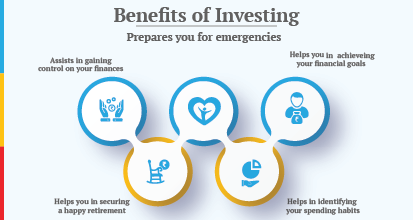Investment Options in India for Wealth Management
Each of the strategies described above has corresponding investment options that can help you achieve the goals for that stage. Some examples of popular instruments for each stage are listed below:
1. Accumulation Strategy:
The focus is clearly on getting above-average returns and building a strong base so that the power of compounding gives better returns in the medium/long run.
- Mutual Funds/ELSS: Mutual funds invest in equities and have funds focused on specific industries and or stock indices. You can choose the type of fund depending on the risk appetite and targeted return.
- Unit Linked Insurance Plan (ULIP): ULIPs also invest in equity and debt just like mutual funds do. But ULIPs come with additional advantages. ULIPs have insurance coverage that comes with the investment. Moreover, both the investment and the maturity amounts have tax benefits, which means you save money on taxes as well.
- National Pension Scheme (NPS): NPS helps you invest in a diversified and dynamic portfolio of equity, debt, and alternative assets. This automated portfolio investment reduces your portfolio risk as you age and will ensure safe investments by the time of maturity. You can withdraw up to 60% of the corpus as a lump sum and must invest the rest to receive an annuity.
Recommended Reading - NPS Withdrawal Rules
Other than the diversified portfolios, you can also consider buying stocks directly. Stocks can offer huge value accretion over time as well as a possibility of dividend income. Investing in Gold ETFs, and REITs (Real Estate Investment Trusts) will also fall under this strategy. However, these investment options may not allow tax savings.
2. Preservation Strategy:
Consolidation is the mantra here. The degree of consolidation will increase as you progress through this stage and approach retirement.
National Savings Certificate (NSC): NSC is offered by the Post Office and is very similar to the tax-saving 5-year bank deposit. The rate of interest for an NSC is 6.8%, which is a tad higher than the current rate of interest for bank deposits. The lock-in period is 5 years, and the amount invested is deductible from taxable income under section 80C. Interest is compounded annually, and this annual interest can also be deducted from taxable income. However, the interest amount receivable on maturity is taxable.
Also Read - Is Pension Taxable?
ULIP/Guaranteed Return Plans: ULIP plans offer you investment into safer debt funds. You can allocate 100% of your funds to debt funds while enjoying the tax benefits on your investment. Even when you start with a 100% equity investment, you can later switch to 100% debt in ULIPs. Tax benefits and bonuses ensure that your wealth is safe from market forces, inflation, and taxes.
Alternatively, you may invest in guaranteed return life insurance plans where the return is assured so that you can predict the maturity value.
3. Distribution or Income Strategy:
You need the money at this stage. Moreover, you need guaranteed cash flow post retirement when your income from employment or profession will dry up.
Bank and Post Office Fixed Deposit (FD): Both bank and post office FDs give almost the same rates of interest. If one is highly risk averse, FD is the right choice for investment. The interest rate hardly beats inflation but the person is assured that the money is in safe hands.Unless one is investing in the 5-year tax-saving FDs, you will not get any tax benefits for other FDs. But you can receive a defined sum into your account as interest payments.
Your current state of finance portfolio is important when planning your wealth growth strategies. Keep a holistic view when investing and have the patience to stay invested. Hiring professional wealth managers to help you make decisions based on concrete data will preclude you from making costly mistakes. Factoring in constraints, opportunities, goals, and personal circumstances is essential when drawing a wealth management strategy.










